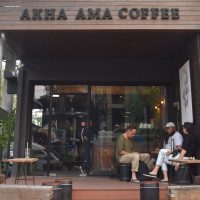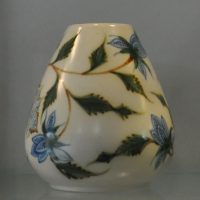 Exactly three weeks ago today, Amanda and I set off to drive from Atlanta, Georgia to Portland, Maine, a three-day journey that would take us through some lovely scenery along sections of the Blue Ridge Parkway. However, before we got there, we stopped at Alma Coffee Roastery, a chance discovery which we made while planning the route. It’s on Holly Springs Parkway, which runs parallel to I-575, connecting Woodstock in the south and Canton to the north.
Exactly three weeks ago today, Amanda and I set off to drive from Atlanta, Georgia to Portland, Maine, a three-day journey that would take us through some lovely scenery along sections of the Blue Ridge Parkway. However, before we got there, we stopped at Alma Coffee Roastery, a chance discovery which we made while planning the route. It’s on Holly Springs Parkway, which runs parallel to I-575, connecting Woodstock in the south and Canton to the north.
The roastery, which doubles as a coffee shop, is just off the parkway on the left as you drive north, with clear signage and plenty of parking, although there’s no public transport access. A generous outdoor seating area stands in front of the roastery, while inside, a neat coffee shop with a handful of tables occupies the right-hand side of the large roastery building.
Alma Coffee specialises in Honduran coffee, much of it from the owners’ family farms. You can buy any of the roastery’s output in retail bags, while Soulmate, a medium-roast washed coffee, is available through a concise espresso-based menu, along with various iced versions. Alma Coffee only serves in disposable cups, so don’t forget to bring your own.





